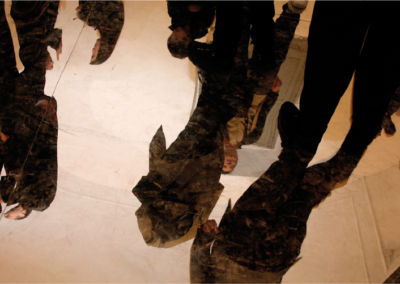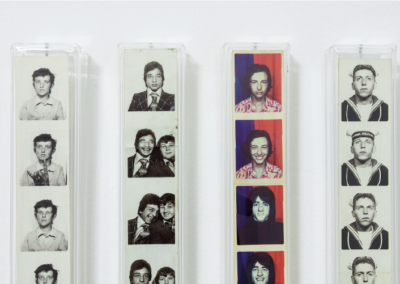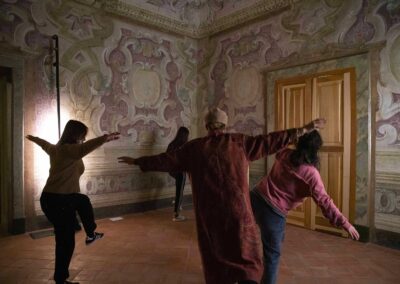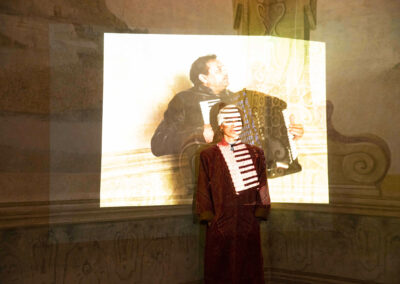The Otolith Group were commissioned to curate a film series for the Dhaka Art Summit 2020 (DAS 2020) as well as contribute a film/installation (O Horizon) as part of one of the exhibitions. They approach their work/curation as an artistic practice of building intergenerational and cross-cultural platforms.
In 2019, DAS curators, seeking ways of working outside the bustling capital of Dhaka and with aspirational young people from the region, had met with educators from the Asian University for Women (AUW), an independent regional institution dedicated to women’s education and leadership development based in Chittagong, 250 kilometres from Dhaka. DAS was particularly interested in working with AUW as its student body is made up of women from different socio-economic backgrounds.
With a bit of logistical juggling (and extra budget provided by the British Council) DAS was able to make the most of the Otolith Group’s time in Bangladesh by hosting an intensive workshop for the students at AUW in Chittagong before DAS 2020, led by the Otolith Group and then bringing the students to Dhaka for the Summit itself. We were especially pleased that this group of enthusiastic film makers were able to spend time with experienced film makers who were role models with whom they could identify.
Key to the initiative was the shared approach and ethos of DAS and the Otolith Group, who agreed to travel first to Chittagong to run the four-day workshop/training with students around the idea/philosophy of ‘Blackness’ and ‘other ways of knowing and doing’.
DAS is an education platform— the fifth edition (7-15 February) convened a critical mass of artists, thinkers and participants. The Summit itself was activated by intellectual and curatorial contributions spanning four floors of the Shilpakala Academy in the city’s vibrant university belt. Built through alliances across Africa, Australia, South and Southeast Asia (and also extending into Europe and the US) the platform was free to the public and included contributions by 500 individuals including artists, scholars, curators and collectives, gathering together for panel discussions, performances, and symposia as well as opportunities for participation from the 477,000+ visitors.
AUW stands out in its explicit mission to graduate leaders and change agents. The University seeks to foster in its students a sense of social tolerance, the ability to frame and develop debates based on critical thinking, and the inspiration to envision large-scale change. AUW’s curriculum ensures that alumnae will have the knowledge and skills to have an immediate positive impact on their respective societies.
In early November, 2019, AUW tutors put out a call for participants looking for those who had an interest in documentary/moving image and were 18 years of age or older. Nearly 20 students wrote essays about why they were interested; using interviews to make the final decision, 12 were selected to participate in the workshop.
Jasmine (Nepal)
Phuong (Vietnam)
Zahra (Afghanistan)
Samira (BD)
Rubina (BD)
Zariza (BD)
Sumanah (BD)
Aksha (Nepal)
Mansoora (Afghanistan)
Manisha (Nepal)
Shahnooz (Pakistan)
Naw Angel (India)
Working with project leads from the British Council, DAS, the Otolith Group and AUW, a curriculum was agreed, focused on background reading, screening and discussions, allowing flexibility for the four days to evolve based on the student’s uptake.
From 27-30 Jan, 2019, the Otolith Group ran the workshop. All students attended (with a single absentee on one day) and enthusiastically participated. Several group suppers were held to facilitate more informal discussion.
The project leads had also kept open the arrangements for bringing some or all of the participants to the Summit in Dhaka. It was decided early on to bring ALL of the participants as a group for four days. This was because the group quickly formed a bond and expressed genuine interest in attending/supporting the Otolith Group’s film series at the Summit.
On the 31st, the Otolith Group transferred to Dhaka and on 07 Feb, all of the participants (except for one who was unable to come) travelled to Dhaka and attended the Summit (especially film screenings), met artists and curators, engaged with performance art and attended a roof-top party for Summit artists.
Discussion of Objectives/Diversity and inclusion
The Otolith group represent a diverse, creative and inclusive Britain: founded in 2002 by Anjalika Sagar and Kodwo Eshun, who live and work in London. Their work is research based and spans the moving image, audio, performance, installation, and curation. The Otolith Group’s films, installations, and performances are driven by extensive research into the legacies of tricontinentalism focusing on Asia, Africa, and South America. They are particularly interested in exploring the aesthetics of black radicalism. In 2010 The Otolith Group were nominated for the Turner Prize.
The workshop and engagement with the Otolith Group became a rich platform for cultural exchange. Not only were the participants from six countries across South Asia but through their engagement with non-white UK-based artists they found commonalities as well as unique perspectives regarding ways to negotiate the world.
Not only did the intensive workshop provide the students with a critical introduction to radical lens-based film making—but the fact that the participants experienced a world class event as ‘behind the scenes’ participants exposed them to theory and practice. And, both theory and practical experiences gave them the opportunity to experience diversity and inclusion—meeting artists and thinkers from the region with whom they could identify.
Lessons learned:
Look for synergies, especially artists/thinkers who are possible role models
Learn more about the capacity of artists, explore their experience with knowledge sharing platforms
Look for additional funding for a discrete education/outreach activity leveraging core funding as a matching grant
Allow time for visiting artists to recalibrate if they run an intensive workshop
Look for ways to integrate workshops/education into the core activity








